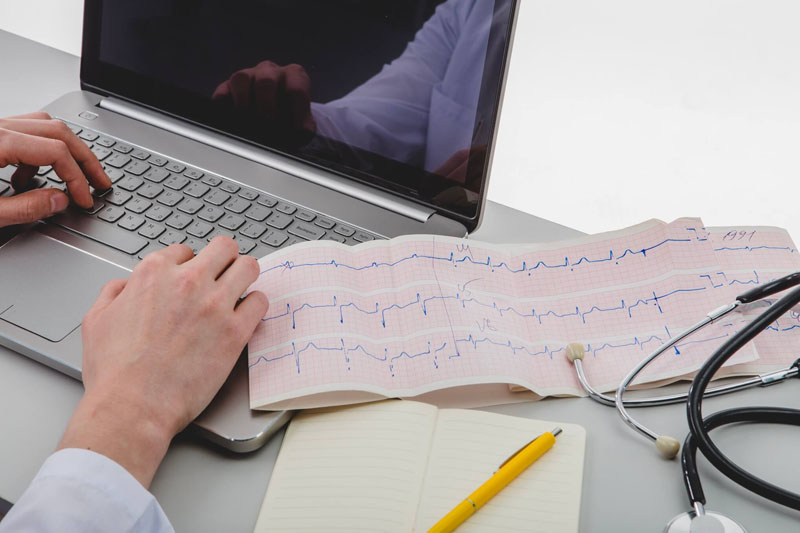Cardiovascular health is crucial for overall well-being. A healthy heart ensures a more active, fulfilling life free from cardiovascular diseases, which unfortunately remain a leading cause of mortality worldwide. For this reason, undergoing regular cardiac exams is a preventative measure you shouldn’t overlook.
These exams help detect issues early, monitor heart function, and initiate appropriate treatment when necessary. Below are the most common and essential cardiac exams to protect your cardiovascular health.
Electrocardiogram (ECG)
The electrocardiogram is one of the most commonly used cardiac exams. It’s a simple, quick, and non-invasive procedure that records the heart’s electrical activity through electrodes placed on the chest, arms, and legs.
What it’s used for:
– Detecting cardiac arrhythmias (irregular heartbeats).
– Identifying problems in the heart’s electrical conduction system.
– Diagnosing ischemias or myocardial infarctions.
This exam is ideal for evaluating basic heart health and identifying abnormalities that may require more detailed studies.
Echocardiogram
An echocardiogram is an ultrasound-based test that uses sound waves to create moving images of the heart. It’s an essential tool for assessing heart structure and function.
What it’s used for:
– Visualizing heart size and wall thickness.
– Evaluating the function of heart valves.
– Detecting congenital or acquired heart issues, such as murmurs or heart failure.
This painless exam provides detailed information about heart health.
Stress Test (Exercise Tolerance Test)
The stress test evaluates how the heart functions during physical activity. It involves walking or running on a treadmill (or cycling on a stationary bike) while monitoring heart rate, blood pressure, and respiration.
What it’s used for:
– Detecting coronary artery disease and blockages.
– Evaluating physical capacity and heart response to exertion.
– Identifying circulation problems during exercise.
This exam is particularly important for individuals with cardiovascular risk factors, such as hypertension or diabetes, and for those planning to start an exercise program safely.
Holter Monitor
The Holter monitor is a portable device that records heart rhythms over 24 to 48 hours, providing insight into how the heart works throughout daily activities and sleep.
What it’s used for:
– Detecting intermittent arrhythmias that might not appear on a standard ECG.
– Evaluating symptoms like palpitations, dizziness, or fainting.
– Monitoring the effects of treatments or medications on heart rhythm.
This exam gives a more comprehensive picture of heart function in real-life settings.
Ambulatory Blood Pressure Monitoring (ABPM)
Ambulatory blood pressure monitoring measures blood pressure over 24 hours while the patient goes about daily activities. It’s a non-invasive exam performed using a portable device.
What it’s used for:
– Detecting hypertension that may not be evident during medical visits.
– Monitoring blood pressure fluctuations throughout the day and night.
– Adjusting antihypertensive treatments.
This test is particularly helpful for individuals with unstable blood pressure or “white coat hypertension” (elevated readings due to anxiety in a medical setting).
Coronary Angiography
Coronary angiography is an advanced procedure that uses contrast dye and X-rays to visualize the coronary arteries. It’s an invasive exam but highly effective for diagnosing severe heart conditions.
What it’s used for:
– Detecting blockages or narrowing in the heart’s arteries.
– Assessing blood flow and heart function.
– Planning interventions like stent placement or bypass surgery.
This exam is typically performed when clear symptoms of coronary artery disease, such as chest pain or shortness of breath, are present.
Cardiac Magnetic Resonance Imaging (Cardiac MRI)
Cardiac MRI is an advanced imaging technique that uses magnets and radio waves to create precise and detailed images of the heart and surrounding tissues.
What it’s used for:
– Assessing damage to heart muscle after a heart attack.
– Detecting tumors, inflammation, or scarring in the heart.
– Providing critical information about heart structure and function.
This safe, non-invasive test is invaluable in complex cases.
The Importance of Regular Cardiac Exams
Regular cardiac exams are the best way to prevent heart disease and ensure a healthy, fulfilling life. If you have risk factors such as high blood pressure, elevated cholesterol, diabetes, or a family history of heart problems, it’s even more important to undergo regular check-ups.
You May Also Like: Strategies to Prevent Heart Disease
Schedule an Appointment at Doctor Urgent Medical Care
At Doctor Urgent Medical Care, we offer comprehensive cardiac exams to help you maintain your cardiovascular health. Our professional team is dedicated to providing high-quality, personalized care to safeguard your well-being.
Take control of your health—call us or book an appointment today. Your well-being is our top priority!





